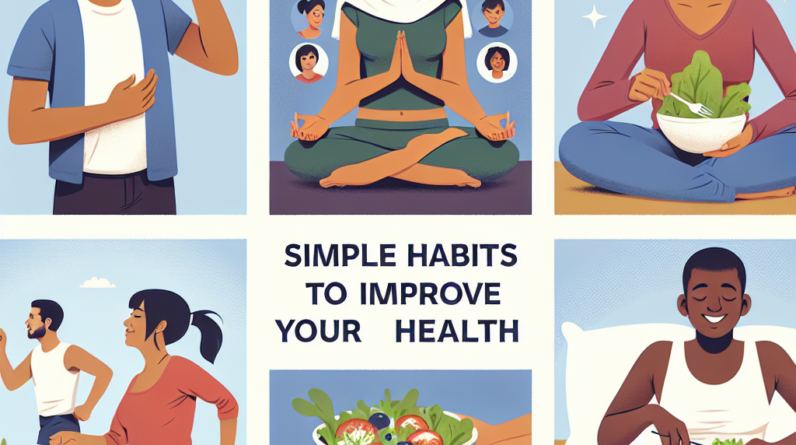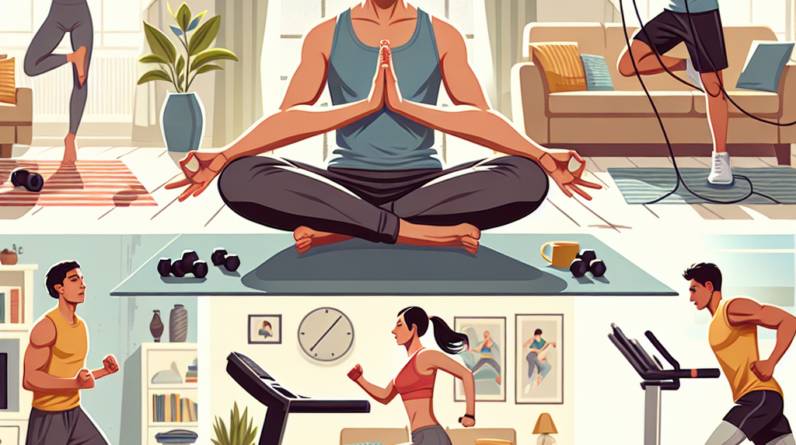
1. Eat More Whole Foods
Understanding Whole Foods
When I first embarked on my journey to better health, diving into the world of whole foods felt like a game changer. Whole foods are basically those foods that are as close to their natural state as possible—think fruits, veggies, whole grains, nuts, and seeds. These foods don’t come with the extra additives and preservatives you find in most processed options. They’re packed with nutrients that support overall health.
Get a Huge Discount and Bonus! Try for 90 Days Risk Free
I remember replacing my usual breakfast of sugary cereals with oatmeal topped with fresh fruits and nuts. What a difference! Not only did I feel fuller, but I also had more energy to kick off my day. Whole foods provide a stable source of energy and help keep those pesky afternoon slumps at bay.
Plus, cooking with whole foods can be a fun and rewarding experience. It’s almost therapeutic to chop up fresh veggies and throw them together in a colorful salad. So, next time you’re at the grocery store, skip the aisles filled with processed junk and stock up on the good stuff instead.
Meal Prepping
One habit that has really stuck with me is meal prepping. I used to be a master of last-minute takeout, which rarely resulted in healthy choices. However, dedicating a few hours each week to preparing meals has saved me from those late-night junk food binges. I usually chop veggies, grill a few chicken breasts, and prepare some grain-based salads. It’s that simple!
The beauty of meal prepping is that it keeps me on track throughout the week. I can grab a healthy lunch or dinner quickly, which makes it super easy to avoid the unhealthy temptations that tend to creep in during busy weekdays.
It’s also fun to experiment with different recipes, so I never feel like I’m eating the same boring meals over and over again. Whether you’re a novice or a seasoned chef, meal prepping can suit any skill level and is key to maintaining a healthier diet.
Mindful Eating
Let’s talk about mindful eating for a minute. This practice has completely transformed how I relate to food. Instead of mindlessly munching while scrolling through my phone or binge-watching my favorite show, I now try to focus on my meals when I eat. It sounds simple, but it requires a bit of practice.
When I consciously pay attention to the flavors, textures, and aromas of my food, I find that I savor each bite much more. This mindfulness often leads to feeling full more quickly, which means I’m not overeating. Plus, it’s a great way to truly enjoy what I’m consuming.
To try this out, set aside some time to enjoy your meals without distractions. Put away your phone, turn off the TV, and really connect with your food. It’s amazing how this small change can enrich your dining experience and promote healthier habits.
Get a Huge Discount and Bonus! Try for 90 Days Risk Free
2. Stay Hydrated
The Importance of Hydration
I can’t stress enough how crucial staying hydrated is for overall health. When I don’t drink enough water, I feel sluggish, my skin suffers, and I find it hard to concentrate. Water plays a key role in nearly every bodily function, helping to regulate temperature, transport nutrients, and remove waste.
To make sure I’m drinking enough, I carry a reusable water bottle wherever I go. It’s become a part of my routine. I even set reminders on my phone to help me remember to sip throughout the day. Trust me, once you make hydration a priority, you’ll notice the difference in your energy levels and cravings.
Plus, let’s not forget about the delicious options out there. Infusing your water with fruits, herbs, or even cucumber can add a refreshing twist that makes drinking water more enjoyable. Get creative with it!
Listening to Your Body
It’s amazing how often we ignore our thirst signals. I know I did for years. When I’m focused on work or a binge-watch session, I forget to drink water, and my body pays the price. Learning to listen to your body when it comes to hydration has been a game changer for me.
Need a Serious Energy BOOST? Huge Discount Try for 90 Days Risk Free
If you’re feeling fatigued or getting a headache, it could be a sign that you need to drink some water. I’ve started keeping my water bottle in sight as a reminder to check in with my hydration levels regularly. This small tweak has helped me become more in tune with what my body needs.
It’s all about cultivating a routine where hydrated habits become second nature. Whether it’s during meals or after exercise, make sure you’re giving your body the water it craves.
Herbal Teas and Other Hydrating Beverages
While water is king when it comes to hydration, I’ve found that herbal teas and other hydrating beverages can be great additions as well. Some nights, when I want something cozy to drink, I’ll enjoy a warm cup of herbal tea instead of reaching for soda or other sugary beverages.
These teas can be packed with antioxidants and are generally low in calories. Plus, there are endless flavors to explore! From peppermint to chamomile, each one has its unique benefits and can help keep me relaxed and hydrated.
Other options, like coconut water or smoothies, can also contribute to hydration while delivering a nutritional punch. Just remember to watch out for added sugars in those drinks. Having a variety of options helps keep things interesting and fun!
3. Incorporate Regular Physical Activity
Finding Activities You Enjoy
When I think about incorporating regular activity into my life, I realize how essential it is to choose things that I genuinely enjoy. For a while, I forced myself into repetitive workouts that left me feeling drained rather than invigorated. Eventually, I discovered that activities like dancing and hiking ignited a passion for movement.
Exploring different options is key—maybe you’ll love kickboxing or yoga. The best part? There’s no ‘one-size-fits-all’ approach to fitness. It’s about finding what works for you and fuels your joy.
When movement feels enjoyable, it becomes less of a chore and more like a celebration of what my body can do. Make a list of activities you’re curious about and don’t hesitate to try something new. You might just find your new favorite workout!
Setting Realistic Goals
Next up is setting achievable fitness goals. I’ve had my fair share of lofty aspirations, but I learned that aiming too high can lead to disappointment. Instead, I now set small, manageable goals that motivate me to stay active.
For instance, instead of saying I want to run a marathon in a month, I started with committing to walk 10,000 steps a day. And guess what? After hitting that target, I’ve gradually added more challenging activities. It’s all about celebrating the little victories along the way.
The satisfaction that comes from those small achievements fuels my motivation, keeping me aligned with my long-term health objectives. Remember, progress is progress, no matter how small!
Making Movement a Habit
How to make physical activity a consistent part of life? It’s a matter of creating a routine. Filling my calendar with workout dates and taking note of those times has made a world of difference. I think of it like any other appointment—just as important!
Finding an accountability partner can also help maintain this habit. Whether it’s a friend who joins me for weekend hikes or an online workout buddy, having someone to share the journey makes it much more fun. Plus, it’s harder to skip a workout when someone’s counting on you!
Good Health Solution is Easier Than Most People Think!
Take a Look for Yourself!
Lastly, don’t be afraid to switch up your routine. Keeping things fresh helps prevent boredom and keeps you engaged in your activities. Consider it an adventure that promotes not only physical health but mental well-being, too.
4. Prioritize Sleep
Understanding the Importance of Rest
A good night’s sleep can transform your entire day, and I truly learned this the hard way. I used to think I could power through the day on just a few hours of sleep. However, after experiencing constant fatigue, I realized how vital sleep really is for my health and productivity.
Sleep is our body’s way of repairing itself. During these hours, our brains process memories, and cells regenerate. A solid sleep routine leads to better mood regulation, improved cognitive function, and a stronger immune response. Trust me, when I prioritize my sleep, everything else falls into place more easily!
Start aiming for those recommended 7-9 hours each night. I noticed that when I established a consistent sleep schedule, my energy levels soared, and my overall mood improved dramatically. Setting a relaxing pre-sleep routine has also made a difference.
Creating a Sleep-Friendly Environment
I found that setting up a calming sleep environment truly promotes better rest. This means making my bedroom a sanctuary—think comfy pillows, dark curtains, and cool temperatures. Decluttering the space has also helped me feel more at peace when I’m winding down.
Also, I try to limit screen time at least an hour before bed. The blue light emitted by screens can mess with our natural sleep cycles. Instead, I often read a book, listen to soothing music, or practice meditation. These acts help ease my mind and facilitate a smoother transition to sleep.
Every little change can impact how well you sleep. I encourage everyone to test out specific changes and see what works for them. Isn’t it amazing how creating a peaceful sleep environment can dramatically affect your overall well-being?
Napping and Rest Days
I know that not everyone can get a full 7-9 hours every single night. That’s where short naps come into play! I’ve also learned the benefit of incorporating rest days into my routine. Sometimes all we need is a quick power nap of 20-30 minutes to recharge and face the day.
I find my most creative moments spring forth after a nap. At times, the universe seems to align perfectly after I’ve taken a moment to pause. Rest days are equally significant – they allow my muscles to recover while keeping the routines fresh.
So don’t hesitate to incorporate short naps and rest days as needed. They’re not a sign of weakness; rather, they’re powerful tools that help me maintain my health journey in a sustainable and balanced way.
5. Manage Stress Effectively
Identifying Stress Triggers
Understanding what stresses me out has been one of the most freeing realizations in my journey toward better health. Identifying stress triggers can pave the way for a more balanced lifestyle. For me, things like juggling responsibilities or financial concerns can lead to overwhelming stress.
Once I pinpointed specific stressors, it became easier to address them directly. Keeping a journal has been incredibly helpful for tracking what causes me stress. I encourage you to consider writing down your experiences as well.
With knowledge comes power. Knowing what stresses you can help design strategies to run toward healthier coping mechanisms instead of unhealthy choices. This awareness has indeed made a profound difference in my daily life.
Practicing Mindfulness and Relaxation Techniques
Mindfulness has become my go-to for managing stress. Anytime I start feeling overwhelmed, I dedicate a few moments to breathing exercises or short meditations. It’s incredible how just a few deep breaths can calm the chaotic mind.
I often turn to apps that guide me through mindfulness exercises, but you can easily find resources online. Something as simple as focusing on your breath can shift your mindset immensely. It’s about creating a small space for mental clarity amid the chaos.
Additionally, I enjoy practicing yoga. Whether it’s a gentle flow or a more intense session, getting my body moving while focusing on my breath has been a perfect combination for stress relief. I encourage you to explore meditation, yoga, or whatever brings you peace!
Establishing Healthy Boundaries
Sometimes, the healthiest action we can take for ourselves is to set boundaries. I’ve learned the hard way that saying ‘yes’ to everything quickly leads me to burnout. I’ve since recognized the necessity of being okay with saying ‘no’ when it comes to commitments that drain my energy more than they inspire me.
For instance, I prioritize my mental health by allocating specific times for work, socializing, and personal time. This balance allows me to engage in the things that truly matter without feeling overwhelmed. Plus, it helps when those around me understand my limits.
By managing my time and commitments effectively, I’ve noticed a marked reduction in stress levels. Remember, your well-being should always come first. When you prioritize your own needs, you’re in a much better position to support those around you.
FAQ
1. What are some simple habits to improve my health?
Some simple habits include eating more whole foods, staying hydrated, incorporating regular physical activity, prioritizing sleep, and managing stress effectively.
2. How can I stay motivated to maintain these habits?
Finding activities you enjoy, setting realistic goals, creating a routine, and surrounding yourself with supportive people can help maintain motivation.
3. How can I effectively manage stress in my life?
Identifying stress triggers, practicing mindfulness or yoga, and setting healthy boundaries are great ways to manage stress effectively.
4. Why is sleep so important for overall health?
Sleep is crucial for physical health as it helps with body repair, brain function, mood regulation, and maintaining a strong immune system.
5. What are some hydration tips to keep in mind?
Carry a water bottle, infuse your water with fruits for flavor, listen to your body’s hunger cues, and consider herbal teas as excellent hydration options.
Remember, healthy habits take time, and it’s all about progress, not perfection. Enjoy the journey!








